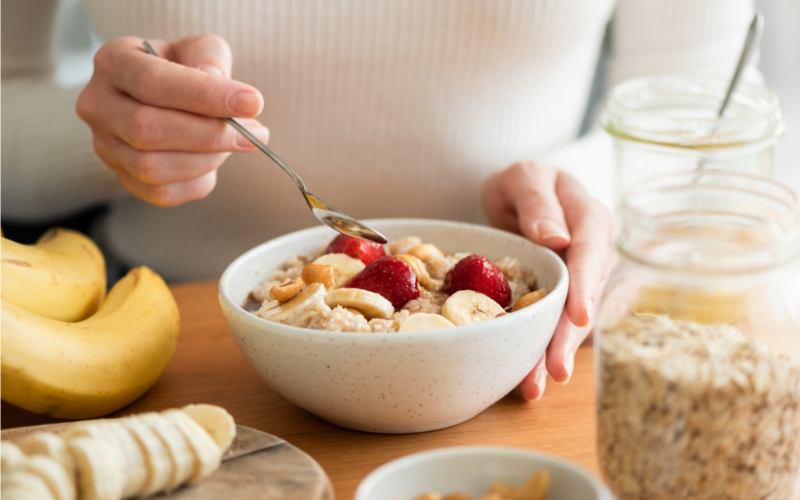Adolescence and food can sometimes become very complicated for some parents . . . Your teen doesn’t always eat well, or jumps from one nutritional trend to another, and it has you concerned? Here’s how to get your child to develop better eating habits and a little insight into what should be on their plate to ensure their proper growth and health!
For both boys and girls, adolescence is a time filled with bodily changes, which must be accompanied by an upgrade in nutrition. Indeed, during these years of growth, your child develops bone, muscle, and fat mass (especially girls), and needs to have a sufficient and balanced diet to develop fully.
Add cooking to their to-do list
The best way to encourage your teen to eat well is to introduce them to cooking. Instead of asking them to take out the recycling or wash the dishes, why not have them help you prepare one or two meals a week, at a time of their choosing? In addition to empowering them, this task will teach them the basics of cooking, such as cutting and trimming meats and vegetables, familiarizing themself with the various cooking methods (on the stove, in the oven, in the microwave, in the air fryer, etc.), using herbs, spices, and aromatics, and so on.
Who knows, maybe they’ll even discover a passion for cooking? One thing’s for sure: they’ll suddenly be very inclined to savour the fruits of their labour, and they might even feel bold enough to change up some recipes and make them their own!
Take advantage of this moment with your child to explore vegetarian and vegan recipes. They’ll find that with the right seasoning, a spicy sauce, or a well-balanced vinaigrette, these dishes never lack flavor. Plus, they’re good for the environment!
Avoid prohibiting certain foods
Prohibiting your teen from eating sweets, chips, and fast food is a great way to encourage them to do . . . the exact opposite! Your best bet is to inform them of the impacts such foods can have on their health, and ask that they limit their junk food consumption. Of course, you can help them control their junk food cravings (and yours, by the same token) by reserving only a tiny part of your grocery cart for such items.
And there is nothing like leading by example! To encourage your child to eat healthier, you must first follow your own rules.
Provide delicious and healthy foods
At dinner, offer water infused with lemon, cucumber, and mint: your child may gradually abandon sugary juices and soft drinks in favour of flavoured water.
Prepare crudités with a dip or homemade hummus and pita bread bites, and leave everything in the fridge, ready to be devoured by your starving teen!
Stock your cupboards with nuts and seeds: even if they’re salty, from a nutritional point of view, they’re still far healthier than other fatty snacks.
For breakfast (the meal most often skipped by teens!), stock up on everything you need to make quick and easy yogurt parfaits (Greek yogurt for added protein, chopped fruits, and granola) or nutritious smoothies (yogurt or silken tofu, milk or fortified plant-based beverage, frozen fruit, bananas, and quick oats). Your teen will notice that this kind of breakfast keeps them feeling fuller much longer than a bowl of sugary cereal does.

Focus on calcium, vitamin D, and other allies
You’ve probably noticed that your teen’s appetite has increased tenfold lately. However, it’s not just about eating more to meet their nutritional and energy needs; they also need to eat healthy. And a healthy diet includes fruits and vegetables, dairy products, nuts and seeds, whole-wheat cereal, and protein (lean meats, tofu and legumes, eggs, etc., which contain zinc).
It is a well-known fact that calcium and vitamin D play an essential role in bone formation. Since 40% of adult bone mass is formed during adolescence, encourage your child to drink plain cow’s milk (and less chocolate milk, which is very sweet) or a fortified soy beverage. Yogurt, cheese, legumes, and almonds also contain high levels of calcium, while many fish (salmon, trout, and Atlantic herring) are full of vitamin D.
With the arrival of menstruation, girls need to consume more iron to compensate for blood loss. Since the iron contained in many vegetables (especially dark green ones) and plants is not as easily absorbed by the body as the iron contained in meat, fish, and seafood, vegetarians can turn to supplements available at Rachelle Béry.
Talk about the benefits of a healthy diet
You can talk with your teen about the benefits of adopting a healthy diet. If your child practices a sport, they will want to eat better to improve their performance, have more energy, and avoid feeling stuffed or heavy, which is often the case when one consumes a meal that is overly fatty or salty right before physical activity.
A diet high in refined sugars and fat can exacerbate acne problems: one more reason to limit such foods as much as possible!
Finally, adolescence is a period of self-discovery: Let your teen try new things and discover what they like best through good old trial and error! There’s nothing better than trying a variety of foods and discovering for ourselves what our body needs and wants!

